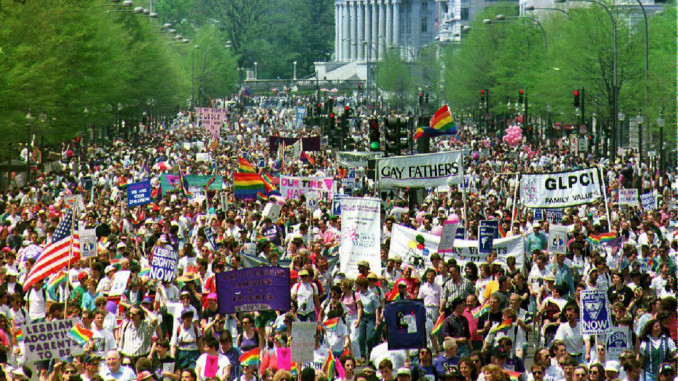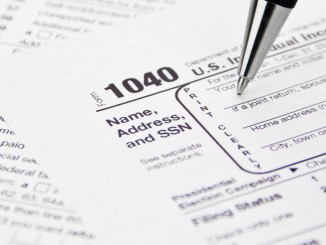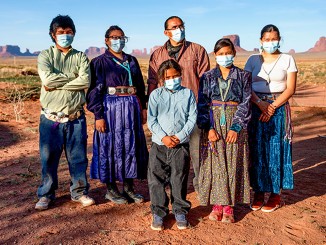
The March
On April 25, 1993, more than a million people participated in a March on Washington for Lesbian, Gay, and Bi Equal Rights and Liberation. Despite being left out of the official title, protestors attended who were also concerned about transgender and other queer rights.
Other marches had occurred during the decade before, with the first one being held in 1979. The marches were the result of a collaborative effort among multiple groups.
The 1993 march called for: the repealing of all laws that criminalize private sexual encounters between consenting adults; greater funding for AIDS research, education, and treatment; the end of discrimination against LGBTQ people in family affairs, such as adoption and custody; the inclusion of LGBTQ people and stories in education; reproductive freedom; an end to sexual discrimination; and an end to racial and other discrimination and violence. Due to the collective power of the people that was displayed at this march and other actions since then, progress has been made on these issues. But despite those efforts, many of these systemic problems persist in the lives of LGBTQ people.
What Has Changed and What Hasn’t in the Lives of LGBTQ People Since 1993?
In 2020, 16 states still had sodomy laws banning gay sex.
The number of HIV infections decreased by 8% between 2016 and 2019.
We counted 42 states that did not have protections for LGBTQ parents.
Data collected in 2022 showed that three states had restrictions against teaching or talking about LGBTQ identities in schools and eight states banned transgender participation in sports on teams that accurately represent their identities. Three states also expanded LGBTQ rights and education laws.
In the last year, we have witnessed a historic rollback of our rights for reproductive freedom and healthcare after the U.S. Supreme Court decided to end the federally protected right to abortion nationwide. In the first six months after that decision, there were 32,000 fewer abortions than would have been expected previously. Such restrictions on reproductive health directly affect any LGBTQ person with a uterus.
These data show that we cannot rely on either the U.S. Supreme Court or any state to protect our rights. We must rely on ourselves.
The problems in the lives of LGBTQ people today go beyond the demands from the 1993 march. While 20% of adults in the U.S. experience mental illness, 39% of LGBTQ people have reported a mental illness in the last year. The data says it’s worse for teens, who are six times more likely to feel depressed and four times more likely to attempt suicide. In addition, more than half of LGBTQ people have been attacked or harassed, sexually or otherwise. Furthermore, 8% of LGBTQ people and 27% of transgender people have had healthcare providers deny them care. Meanwhile, 22% of transgender people report that they have avoided seeing the doctor out of fear of discrimination or after having previously experienced it. Finally, while cisgender people are paid 32% higher wages than transgender people, a wage gap persists in the lives of all LGBTQ people.
Recent Attacks on LGBTQ Rights
More than 483 anti-trans laws have been introduced in all but four states this year. Some of these bills would limit access to gender-affirming healthcare, prevent people from using bathrooms that accurately reflect their gender identity, prevent children and adults from participating on sports teams that accurately reflect their gender identity, censor education on LGBTQ experiences and histories, limit the freedom of speech or expression for LGBTQ folks, or otherwise infringe on LGBTQ rights.
Some politicians are attempting to proclaim that violence and discrimination against LGBTQ people is excusable or even desirable. It is no wonder that many LGBTQ people are feeling depressed. Having your identity and livelihood attacked nearly daily is horrible, but this repression has not been unchallenged. For example, thousands of people participated in protests across the country for Trans Day of Visibility on March 31.
We Must Continue to Fight Back!
This moment reminds us of Urvashi Vaid, a leader in the fight for LGBTQ rights and one of the organizers of the 1993 March on Washington, who said, “We call for an end of bigotry as we know it. The end of racism as we know it. The end of child abuse in the family as we know it. The end of sexism as we know it. The end of homophobia as we know it. We stand for freedom as we have yet to know it. And we will not be denied.”
The March on Washington on April 25, 1993 was critical in bringing attention to the lives of LGBTQ people in the U.S. It helped change the landscapes of the AIDS epidemic and the lives of LGBTQ veterans for the next 30 years. Since then, same-sex marriage has been legalized in the U.S. and thousands more people have felt comfortable being honest about their lived LGBTQ experience. This history does not show us complacency. In the face of unprecedented, uncalled-for, and unacceptable attacks on the lives and rights of LGBTQ people, we would do well to remember that the power to change the lives of LGBTQ people and all oppressed and exploited people for the better lies in our collective hands.




